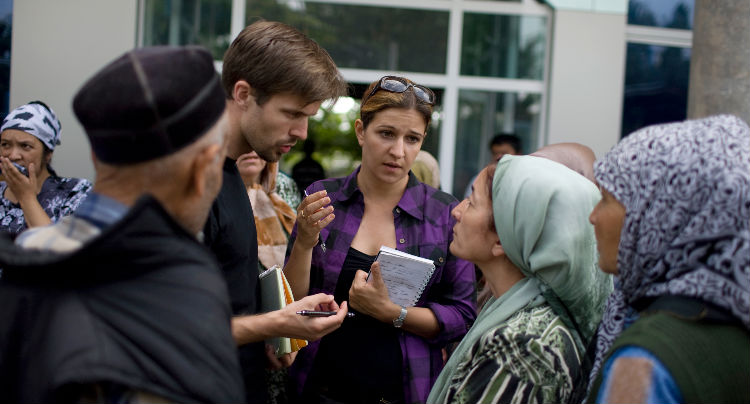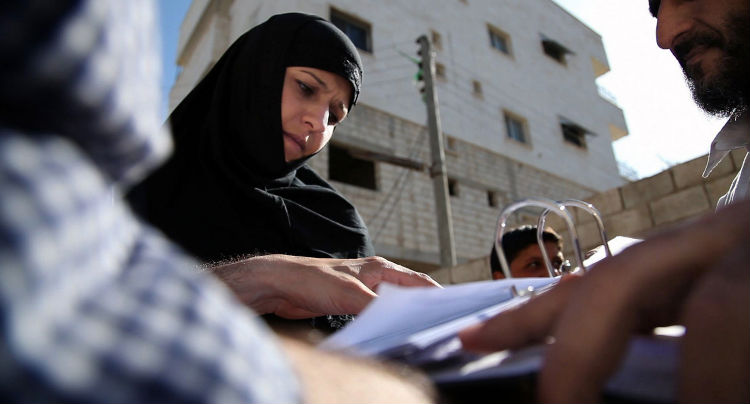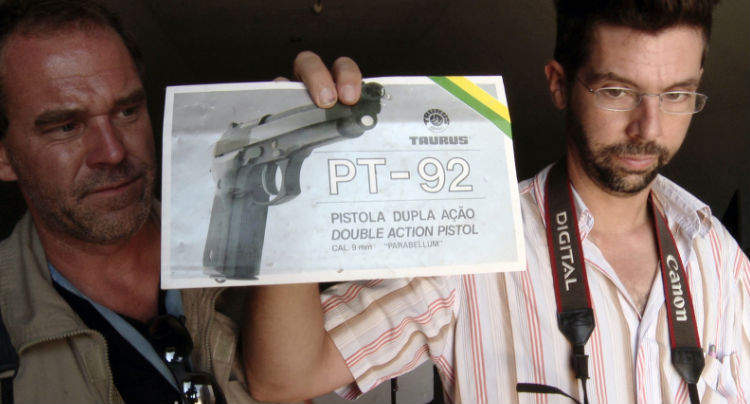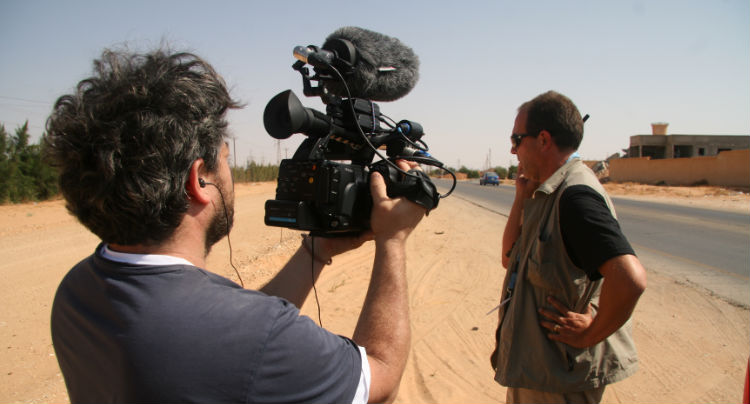The E-Team On Investigating War Crimes: You Cannot Do This Job Without a Sense of Humor

The Human Rights Watch has a special division called the E-Team (Emergency Team), a small team of super-intelligent, intrepid investigators deployed to countries oppressed by abusive dictators to document and get to the bottom of war crimes and atrocities. With the Netflix original documentary E-Team, filmmakers Katy Chevigny and Ross Kauffman take us into the dichotomous world the members of the team live in, sneaking into Syria and collecting clues amongst dead bodies one week, cooking dinner for their family the next. The film follows E-Team members Anya, Ole, Peter, and Fred, and their recent work in Syria and Libya that helped save lives.
On a recent visit to San Francisco, filmmakers Katy and Ross, and subjects Anya and Ole (husband and wife) spoke with us about keeping composure on the field; making a movie about people, not an “earnest” movie with a message; the importance of humor in dire situations; a close-call they had at ISIS headquarters; and more.
E-Team is available to stream on Netflix now

It’s impossible for anybody in your line of work to be able to process the true weight of the lives at stake. Every man, woman and child, every loss…no one has the capacity to process each one, and we’d probably go insane if we could. What is your mindset when you’re in such a devastated environment and have a job to do?
Ole: If you want to do this job for a while, it’s important to strike that balance where you maintain a certain professional distance and are mindful that you are there to do a job and gather evidence. But at the same time, I think it’s incredibly important to sympathize and empathize with the people that we’re interacting with. The moment you stop caring about people, there would be no reason to do this work. Finding that balance can be tricky. Anya was talking today about doing interviews [with the people in these countries] and thinking, “Oh, I may have been to interrogative,” or the other way around, where she got too emotional in the interview. I think it comes with experience, and if you’re not able to strike that balance, you won’t last very long.
Anya: We rarely have the time or mental space to struggle with this philosophical issue. It’s the sense of purpose that helps us get through those situations. We know why we’re there; we’re not there to sympathize and struggle with how on earth such horrible things could happened. We’re there with the concrete purpose to stop atrocities and bring the perpetrators to justice and to make sure people aren’t being killed. It’s very purpose-driven, and it makes it easier to do it.
Are there days when you take a step back and it becomes too much to handle?
Ole: I think some of the most frustrating times in this work are when we’re trying to push a report through the internal vetting and editing procedure at Human Rights Watch. It’s a very long process where you have at least five people looking at every single word you write, and sometimes they have conflicting edits and you just want to get the information out there. It can be quite frustrating. Quite often, being in the field…it’s very rare that those are the moments when you want to give up. Quite the contrary, those are the situations where you feel it’s important you’re there and you want to do it. Usually you return being more motivated and energized than depressed about the state of humanity.
Anya: It’s more the places like Brussels and New York where we’re trying to convince people…that’s where you start getting really frustrated and having serious doubts about whether or not this work makes any sense. But sometimes there are breakthroughs and you’re back to your usual, optimistic, faith-in-humanity self.
Anya, you always seem to be composed at all times, like at the press conference in Moscow where the questions became fairly antagonistic.
Anya: It’s part of my job description. My trip to Russia was very much purpose-driven. I knew exactly what to expect and I knew exactly what I was doing, especially because I grew up in that country. I don’t think it was particularly difficult to stay composed.
Ole, you mentioned that maintaining a measure of emotional distance and balance is a requirement if you want to do your job well. What else is required of a good E-Team member?
Ole: One of the things that helps [me and Anya] a lot is that we have a spouse who does the same thing. We understand each other very well. If Anya goes away for two weeks in the field, I completely understand that. This job would have been incredibly hard to do if you were married to somebody with a more traditional job. For us, that has been very important, being able to share the good and bad moments.
Anya: I would say a sense of humor is very important. You cannot do this work without it. I think that’s what the film captures very well. In these horrendous situations there is always room for very human relationships between us, our witnesses and our translators. I’ve worked a couple of times with people who don’t have a good sense of humor, and that was a nightmare. I think professional knowledge is very important, as boring as it sounds. To be able to carry on in this line of work, you have to be very well trained. Otherwise, it adds to the frustration. Sometimes this job sounds like we venture into the field and it’s a very exciting adventure, but in reality it’s very meticulous and boring. You have to be able to do that with equal vigor and commitment as an exciting day in the field.
The lifestyle of the E-Team members strikes me as bizarre since my life is far less eventful. There are so many highs and lows, and I think the film captures that well. For instance, before Anya enters the big Russian press conference about Syria, you show her putting on make-up and having casual conversation.
Katy: One of the things that Ross and I set out to do was to not just show the team at work. We wanted to see them as people. From a documentary moviemaking standpoint, there are a few different ways you show people as people, and one of them is to capture those moments you could never script. People doing something slightly off-beat, funny, quirky…stuff that makes them who they are that you couldn’t think up on your own. When she’s getting ready for the press conference and complaining about the lack of a mirror…some people would edit those scenes out. Ross and I love those kind of moments. Those are our favorite moments of the movie, and that’s our kind of filmmaking.
Ross: I think people react to that. I think that’s how you create relatable people in a movie, by showing them as regular people.
Right. You could be making a film about the most extraordinary person in the world, but it’s like you’re doing them an injustice if you don’t make a good, absorbing film. If the film isn’t made well, no one will watch it, so consequently no one will learn about the great things the subject did.
Katy: We couldn’t agree more. We were about that all the time. We were trying very hard not to make a certain kind of film.
Ross: The “earnest” documentary.
Katy: Take your medicine, sit in your chair, and watch. We didn’t want to do that. There’s a place for “earnest” documentaries, but it’s not what we wanted to do. We were always saying, “How can we make this more fun? Where can we find humor?”
Ross: It comes down to what your personal taste is when you’re watching movies. Katy and I want great characters and great stories. Let other people throw messages at you. We wanted to form a really watchable, entertaining movie out of that.
Katy: We’re doing these lighter elements of life we wanted to incorporate into the film, but we’re doing that with a subject matter that is on the surface quite heavy. Human rights abuses, human rights protection; these are not light subjects. It was an interesting challenge for us. We weren’t making a film about gardeners growing flowers or something, right?
Ross: That sounds like a horrible movie! [laughs] But to go a step back, we were making a documentary about real people. We went out to dinner with Anya, Ole, Fred and Peter one night to see if we wanted to spend many years with them. They were the ones who seemed to have a sense of humor and liveliness. They could talk about heavy issues and at the same time bring humanity to them. It’s really from them that the feeling of the movie blossomed. Not to use a gardening reference…[laughs]
Anya: From our perspective, that was one of the reasons we agreed to this project both as an organization and personally. We all feel very strongly about what we do. The violations are horrendous and the solutions aren’t easy. But you can’t sit through a 90-minute documentary about this serious line of work unless you can find a way to make it interesting and entertaining and relatable. It was very clear that Katy and Ross weren’t trying to make a serious human rights movie with a message, very serious people sitting around the table telling you what needs to be done to save the world. That wouldn’t be the movie I’d want to watch.

How did this fateful dinner come together?
Anya: Ah, he wants to know more about this dinner! [laughs] What was for dinner?
Ross: I think I had a chicken burrito. [laughs] Katy, why don’t you start from the beginning and how we got involved?
Katy: We knew about the work of Human Rights Watch, but we didn’t know the details. We didn’t know much about the E-Team at all, so we organized this dinner to get to know them a little bit in an informal way. What first struck Ross and I was that they were all so different from each other. Lots of cross-talk, lots of teasing. That was really appealing to us.
Ross: They were like characters in a movie. Anya was the “fiery Russian”.
Anya: Can you come up with a better response? Come on!
Ross: You come up with a better one! [laughs] My point is, they’re all extremely fascinating personalities, and we were hooked.
Like you said earlier, the job of an E-Team member can often be mundane, but it does get sticky every now and again. What steps did you have to take to ensure the cameras wouldn’t interfere with your work during filming?
Ole: There were certain situations where we couldn’t take the camera. Part of the reason why it was Syria and Libya that ended up in the movie was that there were other countries we went to where we had to keep a much lower profile, basically going undercover. It would be impossible to do filming the way we did in Syria and Libya. We had a very clear understanding that, if for security reasons we felt the camera was interfering, they would put them down. There were a couple of occasions, but not many.
Ross: It made total sense from our point of view. It’s a dangerous, sensitive situation, so we listened to the pros every step of the way.
Anya: There was that moment when you were filming ISIS headquarters…
Ross: I was not filming ISIS headquarters! You guys told me to put the camera down too late. [laughs] That was actually scary for me.
Ole: We got pulled over, and they took us to headquarters.
Ross: They told the driver to get out of the car and they asked us for the keys. I was in the front seat as I always was when we were filming. The keys were in the ignition, and all I could think was, “I don’t want them to get the keys to this car.” I grabbed the keys out of the ignition and threw them under the placemat. It’s so stupid, but I didn’t know what else to do! [laughs] They didn’t get the keys.

When you started making this film six years ago, Netflix wasn’t the wonderful platform for documentaries it is today. Talk about the advantages of calling Netflix home.
Katy: Making long-form documentaries takes a while, and by the time you’re done there always seems to be a new distribution model in place, which was the case for this one. We were just trying to make the best film we could, and we weren’t thinking about this distribution platform. In the interim, Netflix has become a global force and home for documentaries. We’re very excited for this film, because it’s a part of this new effort by Netflix, this Originals section. Less than a year ago, they started acquiring documentaries like ours and going worldwide all at once. For us to have the millions of Netflix subscribers to be able to watch E-Team is an unprecedented opportunity for us as filmmakers. We’re independent filmmakers and were a crew of one or two while filming. Now it’s going to go out so wide…it’s amazing.
Ross: It’s a wild thought that they’ll pretty much press a button, and then boom, this film is all around the world in millions of homes.
Katy: Five years ago that sounded almost sci-fi.
Ole: It’s a bit scary actually.
Why is it scary?
Anya: He’s been scared from the very beginning! [laughs]
Ole: It’s terrifying. They had 350 hours of footage on us they could cut any way they wanted. I’m not terribly comfortable with all the attention being on us. I’m fine with talking about work and giving interviews about work, but…you know, I think it’s great.
Ross: It’s great for us, the filmmakers, but it’s also great for spreading awareness about the E-Team’s work.
